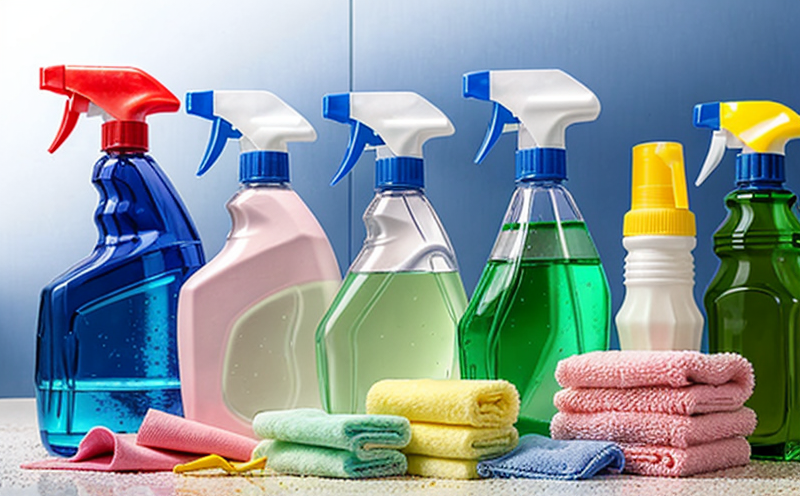Thermal Stability Testing of Cleaning Solutions
In today's stringent regulatory environment, ensuring that cleaning products and detergents meet safety and quality standards is paramount. Thermal stability testing plays a crucial role in validating the performance and safety of these solutions under varying temperatures. This service ensures that your cleaning formulations do not degrade or release harmful substances during storage or use at typical environmental conditions.
Thermal stability is particularly critical for consumer products, as it affects both product integrity and user safety. For instance, certain chemical compounds in detergents can break down over time when exposed to heat, potentially releasing volatile organic compounds (VOCs) that could be harmful to human health or the environment.
The process involves subjecting cleaning solutions to controlled temperature conditions for extended periods. The test aims to determine whether the product maintains its chemical and physical properties after exposure to high temperatures without compromising safety or efficacy. This is especially important in sectors like household goods, where prolonged storage at ambient temperatures can vary widely depending on geographical location.
Our team of experts uses advanced equipment such as differential scanning calorimetry (DSC) and thermogravimetric analysis (TGA) to conduct these tests. These instruments provide precise data on the thermal behavior of the sample, helping us identify any potential issues early in the product lifecycle. The results are then analyzed using international standards like ISO 11357-2 for liquid detergents.
One of the key benefits of this testing is its ability to predict shelf life accurately. By understanding how your cleaning solutions behave under different temperature conditions, you can optimize packaging and storage recommendations to extend product longevity while ensuring consistent quality.
- Improved Product Quality: Ensures that the cleaning solution remains effective throughout its intended use.
- Safety Assurance: Guarantees that no hazardous materials are released during use or storage.
- Regulatory Compliance: Helps meet stringent environmental and safety regulations.
- Packaging Optimization: Enables better design of packaging to withstand temperature variations.
The testing process typically involves preparing the cleaning solution according to specified protocols, placing it in a controlled environment chamber, and monitoring changes over time. The outcome informs necessary adjustments to formulation or storage recommendations to maintain product integrity.
This service is essential for quality managers, compliance officers, R&D engineers, and procurement teams who are responsible for ensuring that their products meet the highest standards of safety and efficacy. By leveraging our expertise in thermal stability testing, you can gain valuable insights into your cleaning solutions' performance under real-world conditions.
Scope and Methodology
The scope of thermal stability testing covers a wide range of cleaning products and detergents. We test various types of formulations including liquid, powder, and concentrated solutions to ensure they meet the required standards for safety and performance.
The methodology involves several critical steps:
- Sample Preparation: The cleaning solution is prepared according to specified protocols to ensure consistency across tests.
- Temperature Exposure: Samples are subjected to controlled temperature conditions, ranging from room temperature up to 100°C or higher, depending on the product's intended use and storage environment.
- Data Collection: Instruments like DSC and TGA continuously monitor the sample for any changes in thermal behavior. This includes tracking phase transitions, decomposition points, and weight loss.
- Analysis: The collected data is analyzed against international standards to determine if the product maintains its stability over time.
The results of this testing provide a comprehensive understanding of how your cleaning solutions behave under different temperature conditions. This information can be used to make informed decisions about formulation adjustments, packaging design, and storage recommendations.
Customer Impact and Satisfaction
Environmental and Sustainability Contributions
Thermal stability testing also contributes significantly to environmental sustainability efforts. By ensuring that cleaning products maintain their effectiveness over time, we help reduce waste generation and the need for frequent repurchases. This not only conserves resources but also reduces the carbon footprint associated with production and transportation.
In addition, by adhering to strict safety standards during testing, we minimize the risk of hazardous materials being released into the environment. This aligns with broader sustainability goals in reducing pollution and promoting a healthier planet.
Our commitment to environmental responsibility is reflected in our state-of-the-art facilities and cutting-edge instrumentation. We continuously strive to improve our methods and stay aligned with the latest international standards, ensuring that we provide the most accurate and reliable testing services possible.





